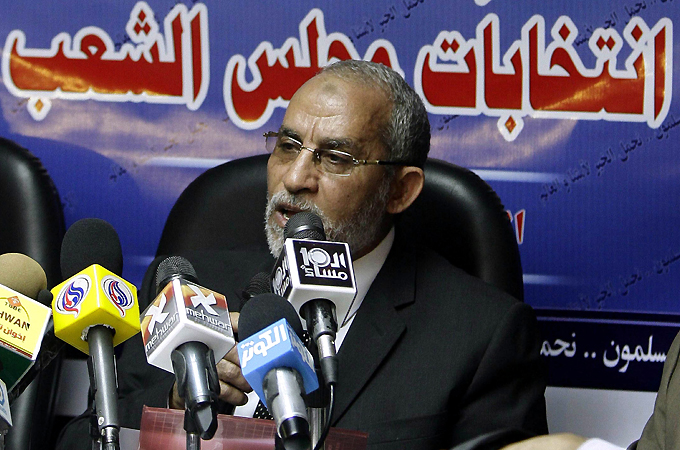Protests as Egypt candidates barred
Government preliminarily denies 57 Muslim Brotherhood candidates from running in polls amid claims of a crackdown.

 |
| Mohammed Badie, the Muslim Brotherhood’s elected leader, announced earlier this year that the group would contest 30 per cent of the seats in parliament. [EPA] |
At least 57 Muslim Brotherhood candidates who attempted to register to run in Egypt’s parliamentary election have been rebuffed by the government, the group said on Wednesday.
At least 132 candidates associated with the group tried to register Wednesday for the upcoming election, but the government only accepted applications from 75. The election is scheduled to be held on November 28.
The Brotherhood was officially banned in 1954, but the Egyptian government tolerates its activities and the Brotherhoods participates in elections by technically running candidates as independents. In Egypt’s most recent parliamentary election, in 2005, the group won 88 of 444 seats.
The candidate registration process, which lasts until Friday, is heavily bureaucratic and involves significant paperwork.
The candidates who were unsuccessful on Wednesday are likely to have the chance to remedy small problems, or appeal against the decision, before Egypt’s Higher Electoral Commission releases the final list of candidates on Sunday.
However, opposition groups are wary that Egyptian authorities will do whatever they can to limit challenges to the ruling National Democratic Party [NDP], and observers both inside and outside the country have accussed the government of a pre-election crackdown.
In recent weeks, authorities have arrested more than 100 people associated with the Muslim Brotherhood.
Protests
Four Muslim Brotherhood members accompanying candidates attempting to register in the city of Fayoum were arrested on Wednesday, and hundreds of people there reportedly came out to protest.
|
|
At least 2,500 people were said to be protesting in the governorate of Gharbiya, where Abdel Halim Hilal, a senior Brotherhood member, was not allowed to submit his paperwork.
Also on Wednesday, judges heard some of the 41 election-related cases that have been filed before courts in Cairo, the capital.
The cases, most of which have been brought by candidates associated with the Brotherhood, accuse the government of unfairly impeding candidates’ efforts to register.
Sayid Gadallah, a lawyer running with the Brotherhood, said officials at a police station in his district refused to give him a certificate of registration, even though he has run before and has been a registered candidate since 1982.
Process ‘impeded’
“It is just another way to impede the electoral process, to prevent nominees from exercising their right to run,” Gadallah told Al Jazeera. “The papers of those who are unfavourable to the state then disappear. This happened before in 2008, and we are filing this case now to obligate the interior ministry to give nominees proof that they have received their papers.”
Nasser El Hafy, another lawyer involved in the cases, said the legal action was the result of “corruption and exploitation that has controlled the country for 30 years, since the ruling National Democratic Party has been in power”.
Brotherhood members were reportedly able to submit their registrations freely in Cairo and in other governorates, including Sharkiya, Beni Suef and Helwan.
In Cairo, registration centres were crowded but calm, with no violence reported.
The Brotherhood, an Islamist political and social welfare group that was founded by Hasan al-Banna in 1928, swept into greater prominence after the 2005 election.
Following months of internal debate over the organisation’s political strategy, Mohammed Badie, the group’s “supreme guide,” announced the Brotherhood would run candidates in this month’s election for 30 per cent of the seats in parliament. The Brotherhood will field new female candidates, after a new law this year reserved 64 seats in parliament for women, increasing the total number of seats to 508.
Hosni Mubarak, the Egyptian president and a member of the NDP, has ruled under emergency law since 1982, when Anwar al-Sadat, his predecessor, was assassinated.